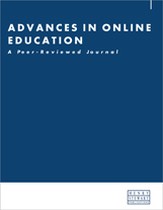Influence of instructors’ adaptability and management of virtual classroom environments on the effectiveness of tertiary students’ virtual knowledge acquisition
Abstract
This paper explored how instructors’ technological adaptability and management of virtual classroom environments affects the quality of students’ virtual learning experiences and the effectiveness of their virtual knowledge acquisition in Ghanaian tertiary institutions. A questionnaire was used to collect data from 700 graduate students. The data was analysed inferentially using the structural equation modelling approach with the analysis of moment structures as the analytical technique. In this technique, path analysis was conducted to test derived hypotheses of the relatedness of the study variables, which served as components in a conceptualised framework developed to guide the study. It was found that instructors’ technological adaptability of virtual classroom environments will directly enhance their management capabilities of virtual teaching–learning systems, which will also directly increase the quality of students’ virtual learning experiences. It was also found that although instructors’ adaptability of virtual classroom environments will not directly increase the quality of students’ virtual learning experiences, it can have an indirect consequence on the quality of student learning. The paper concludes that instructors’ acquisitions of the requisite technological competence to enable them positively to adapt to virtual classroom environments will help enhance their management capabilities of the virtual teaching–learning systems. The study outcome provides academics and education researchers and administrators a good practical perspective of technological adaption of educational teaching–learning tools, systems and mechanisms for enhancing the effective management of virtual classroom systemic activity. It also provides an important pedagogic insight that could enable future study of efficient and effective design of digitised virtual classrooms to enhance virtual teaching–learning practice.
The full article is available to subscribers to this journal (subscription is free).
Author's Biography
Mohammed-Aminu Sanda Dr Mohammed-Aminu Sanda, PhD is an Associate Professor of Human Work Sciences at the Department of Organization and Human Resource Management, University of Ghana Business School in Accra, Ghana. He received his PhD degree in human work sciences (organizational design and management) 2006 from Luleå University of Technology in Luleå, Sweden. Mohammed-Aminu was a Postdoctoral Research Fellow at the same University from January 2010 to December 2011, and an Adjunct Professor of Human Work Sciences at the Division of Human Work Science, School of Business Administration Technology and Social Sciences, Luleå University of Technology in Sweden. As a member of the American Psychological Association and the International Society for Cultural and Activity Research (ISCAR), his research is focused on using macroergonomics and the Systemic Structural Activity Theoretical approaches in creating knowledge in the development of not only efficient and good, but also sustainable organisational practices and work environment through the integration of organisational and human systems in digitised work environments. He served on the ISCAR Executive Committee, representing the Africa Region, from 2011 to 2017. Mohammed-Aminu is currently an external examiner for numerous universities in Ghana. He is also an Assessor of tertiary education programmes for the Ghana Tertiary Education Commission.
Citation
Sanda, Mohammed-Aminu (2024, March 1). Influence of instructors’ adaptability and management of virtual classroom environments on the effectiveness of tertiary students’ virtual knowledge acquisition. In the Advances in Online Education: A Peer-Reviewed Journal, Volume 2, Issue 3. https://doi.org/10.69554/EFST8397.Publications LLP
